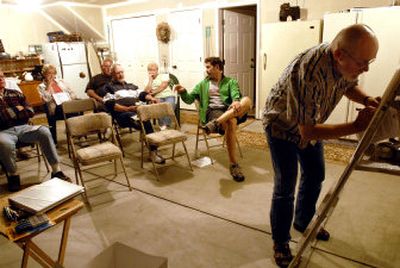Kootenai planners seeking input

Many of Kootenai County’s problems were solved Tuesday night in a three-car garage with neighbors sipping coffee and nibbling homemade banana cookies.
And that’s exactly how the county wants the rewrite of its main land-use planning tool to work – small groups of residents meeting in living rooms, churches or anywhere ripe for conversation about how Kootenai County should look in the future.
This month about 55 residents and organizations will host these intimate gatherings, a concept known as “meetings in a box.” Each host literally gets a big white box filled with instructions, discussion questions, worksheets and even a bag of popcorn. It’s an information-gathering model developed by KezziahWatkins, the Colorado-based consulting firm hired by Kootenai County to get the most residents possible involved in rewriting the county’s comprehensive plan.
The consultants will analyze the responses, looking for common themes, and translate them into specifics the county can use to update the growth plan, which is the foundation of all land-use decisions in the county and dictates which areas of the county theoretically should remain rural.
The discussion questions are open-ended and prompt residents to specifically define in a few words what, to them, is a rural lifestyle in Kootenai County. Then the groups are asked to detail how the county can accomplish preserving this lifestyle.
Phil Clements invited his neighbors in West Hayden Estates, an upper middle-class housing development off Lancaster Road near Hayden. Duane and Paty Mabeus offered their garage – scrubbing the concrete floor, baking goodies and firing up the coffee pot.
Thirteen neighbors walked over, some carrying their own lawn chairs.
Clements, a retired school teacher who still substitutes, joked that he felt like he was giving a test as he set up a stepladder to use as an easel. The conversation flowed freely as soon as Clements launched the initial question about how to define a rural lifestyle.
Large lots in the countryside. Dirt roads. Preservation of forests and meadows. Aquifer protection.
Soon the conversation drifted to Clements’ morning walk when he saw a flock of wild turkeys.
“Oh yeah,” said Mary McCoy. “We saw them yesterday.”
Another neighbor recently spotted a bear.
“Did you have too many mint juleps?” McCoy joked.
Clements wrote “wildlife habitat” on the list.
John Ukich, a young dentist with 16-month-old twins, questioned if their neighborhood with its one-third-acre lots is considered rural. It looks like any housing cluster with manicured lawns, flower pots and American flags. Just down the road are hayfields, forest and other similar small-lot county developments that have wells and septic systems.
The group decided that they aren’t rural but are in a rural area. And most admitted the county probably shouldn’t allow developments like theirs in rural areas.
Then the neighbors demanded to know why the County Commission can so easily change the comprehensive plan. They want a public vote on any change to the growth plan. And they want better notification when the county considers a land-use decision such as a subdivision or zone change request.
The consultants will take these suggestions along with those from other groups and compile a report for the County Commission. The report is expected in mid-December. The commission also will get a verbatim transcript of comments submitted by each group.
“The nice part about citizens in Kootenai County is they are well-informed and very interested and willing to get involved,” consultant Susan Watkins said. “In many communities it’s difficult to get people to engage in a conversation about comprehensive plans.”
Like many areas in the West, Kootenai County is experiencing massive growth. That’s putting pressure on existing neighborhoods and rural areas and has sparked residents to organize.
On Thursday, 300 people packed a conference room at North Idaho College for a public hearing on two proposals to amend the county’s comprehensive plan. That type of participation is becoming common, when only two years ago the most controversial hearings only attracted 40 people.
This is true also of Clements’ neighborhood, which got a crash-course in land-use controversy last year when a developer proposed Hayden Canyon, a 618-acre development off Lancaster Road that could increase Hayden’s population by one-third by adding 1,800 homes.
Many of the meeting-in-the box hosts are associated with neighborhood groups fighting proposals for large developments in rural areas.
Linda Johnson, of Harrison, is working with her neighbors to stop proposals for a luxury golf retreat on the east side of Lake Coeur d’Alene. Many of them are having meetings in a box, but Johnson opted to invite a group of coworkers from a Liberty Lake telecommunications company to meet over lunch. Ten people showed up this past week. They all work in Washington but live in various parts of Kootenai County, from downtown Coeur d’Alene to the Rathdrum Prairie.
Johnson thought the “free-form brainstorming” worked well and shows the passion people have for where they live, even if they aren’t schooled in the technical workings of the county planning department.
“Everybody’s opinion is valid,” Johnson said. “It’s just so healthy. It’s part of the political process.”
The county wants to ensure everyone’s opinions are heard, so the consultants made sure developers, Realtors and builders also participate.
Watkins recommends that if anyone fears slanted results, they should have their own meeting in a box.
“Those who are those who influence things,” Watkins said. “That’s just the way democracy works.”
The Coeur d’Alene Association of Realtors, Concerned Businesses of North Idaho, the North Idaho Building Contractor’s Association and the Coeur d’Alene Area Chamber of Commerce all are having meetings.
“My take on this is they are trying to be very inclusive, very open to what the community wants to see,” said Carrie Oja, executive officer of the Realtors association.
For people not invited to a meeting or those interested in hosting their own, the county is having three public meetings next week at various locations across the county.